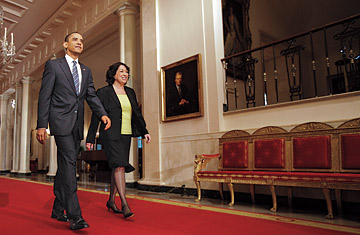
The President with Sotomayor, the first Hispanic female to be nominated to the U.S. Supreme Court.
(3 of 6)
So far, Sotomayor's involvement in an affirmative-action case last year is the episode attracting the most attention. The case, Ricci v. DeStefano, involves a group of 18 white firefighters, including one Hispanic. They filed a discrimination suit against the city of New Haven, Conn., after the city decided in 2004 not to certify the results of a job-promotion exam because no African Americans had scored high enough to be promoted. The city argued that federal law treats tests resulting in such outcomes as suspect, meaning that New Haven would probably have been sued by the minorities who failed the test had the white firefighters been promoted.
A lower court decided in favor of the city. In February 2008, Sotomayor was part of a three-judge panel that upheld the lower-court decision in a very brief ruling. Four months later, she was part of a 7-6 majority that decided not to rehear the case before the full appeals court. Writing for the six dissenters, Judge Jose Cabranes, a Clinton appointee who has been something of a mentor for Sotomayor, said the majority "failed to grapple with the questions of exceptional importance raised in this appeal." The three-judge panel's "perfunctory disposition," he wrote, contained "no reference whatsoever to the constitutional claims at the core of this case"--unusually blunt language for a court known for its collegiality in public.
That case is now before the Supreme Court, which heard arguments last month. On that day, both Chief Justice John Roberts Jr. and Justice Scalia indicated that they believed New Haven officials were concerned only about the test's failure to produce a desired outcome. When a lawyer representing the Federal Government told Roberts that the government would have supported tossing out the exams if the results of blacks and whites had been reversed, the Chief Justice raised a skeptical eyebrow, and Scalia said, "I don't think you'd say that." Gregory Coleman, an attorney representing the firefighters, told the Justices his clients were being punished solely because they are white. "Racial classifications are inherently pernicious and, if not checked, lead as they did in New Haven to regrettable and socially destructive racial politics," he said.
The New Haven dispute will probably be one of the final cases the court rules on before adjourning for the summer in late June. The Justices have already reversed three rulings that Sotomayor had joined over the years. That's not a high number for a longtime appellate judge, and unlike the affirmative-action case, those generally involved such technical issues that it would be hard to build an opposition campaign around them. For instance, this year a 6-3 Supreme Court overturned a 2007 Sotomayor decision that ruled that the Environmental Protection Agency could not use cost-benefit analysis when deciding whether to require power plants to take steps to limit their impact on aquatic life.
